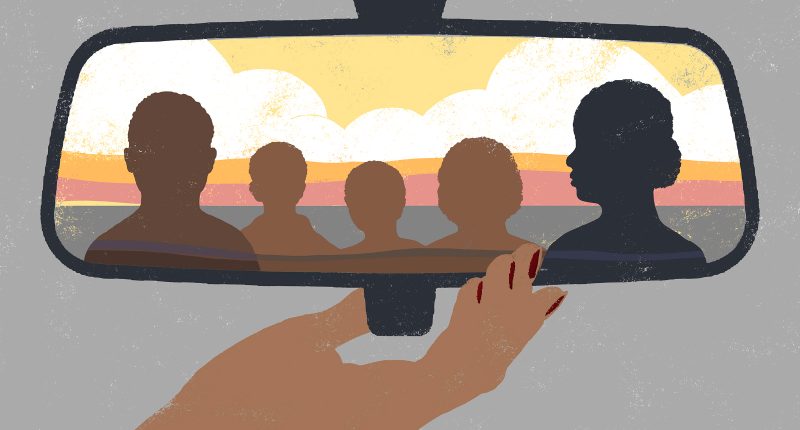
What My Family Taught Me About Loneliness – Growing up, I didn’t really dream of being a wife or mother. Not in the way I dreamed of playing Wimbledon or designing shoes for a living. But one vision of a future family flickered in my mind like an internal live photo:
Five kids sit behind me in a Suburban as we head West, my husband behind the wheel, all of us laughing and singing to En Vogue or Indigo Girls, Kirk Franklin or Janet Jackson. The order of the artists doesn’t matter; everyone gets a turn. This trip will take days, the sky blushing from rose to plum to highway-lit black several times before we’re done.
It’s taken me 30 years to realize that this idyllic image of a future family, made of subconscious odds and ends, was not actually just a figment of my imagination. The summer after I turned 10, my parents packed up our GMC van, bought a TripTik from AAA, and drove my sisters and me from Ohio to California to meet relatives we’d seen only in pictures.
Of course, the fantasy conveniently left out some unpleasant realities from our trip: five days of truck-stop showers in flip-flops and four nights spent sleeping in bucket seats at rest stops to save money. Yet it captured the essence of how I experienced those closest to me. Family, at its core, offered guaranteed belonging. Protection from loneliness.
If you didn’t have friends–and I struggled to make and keep them beginning in junior high–family meant never spending a Friday night alone. And when the world incited more panic than peace in your bones, when your nervous system needed to be bubble-wrapped, family dropped everything. Left the factory floor in work boots and earplugs to pick you up, or answered your frantic calls from the school’s payphone, talking you down until everything—except the truth that you were wired differently—felt light and airy. The youngest and most anxious of three girls, I’d been born into a people who stretched their love and nervous systems over mine, covering me as I moved through a world that constantly overwhelmed me.
I have my own family now, and it looks a bit like the vision. Three kids and a Honda minivan, littered with remnants of kids’ meals, and a fine preacher-educator of a spouse. The five of us can barely make the 15-minute drive to Target, let alone California, without name-calling and “accidental” kicking or fights over who picks the next song.
In this family, where we listen to “Jar of Hearts” and Hypnotize” alongside a mash-up of gospel hits, where we talk about feelings and go to therapy, I am deeply loved. Needed and known. But in the last year, I’ve sensed a difficult truth emerging that can’t be explained by turning 40 or finally being diagnosed with ADHD, after years of thinking it was just an anxiety disorder. There are times when I still feel lonely. Not in the weekend-plans way but in the overwhelming feeling that I wasn’t built for this role and what it requires. I had always thought of family as something that could protect you from loneliness, but what I’m realizing now, all these years after that road trip, is that loneliness also creeps in when you can’t meet your family’s needs—even when some of those needs mirror your own.
Genetically, it makes sense that at least some of my children would have sensitive nervous systems. Why wouldn’t Loop earplugs and Tangle fidgets be part of our shared experiences? But knowing that and responding well are two different things. I have a wonderful spouse, who loves to executive-function and multitask, but even together, we have been stretched so very thin.
When one child requires an airtight schedule while another needs a spontaneous dopamine boost, or when one works best while humming and another can’t find their headphones fast enough, I do not stop, box breathe, and save the day. Nothing in my brain says: Hang in there, you can do this. Give yourself time. Instead, my own personal brand of black-and-white thinking and years of masking and shame declares: You can’t do this. You don’t even fit here, in the very family you helped create.
I know that isn’t true. I do fit here, even when it’s hard. The five of us are built into each another, a part of in ways I’ll never be able to measure or name.
Sometimes I have to remind myself that having an anxiety disorder and ADHD doesn’t give me some superpower connection to my kids. I’ll continue to learn how to best advocate for them and love them (and myself) well, but I’m not the best mom for them because I’m also neurodivergent. I’m the best mom for them because I’m their mom. And it’s OK that I’m still learning what that looks like.
Last year, a school administrator who refused to accommodate my child’s needs offered a visual that, while hurtful in the moment, has become a thing of comfort to me. “I think we’re hanging on by gossamer threads,” she said to us, and we pulled our child from the school. In reality, we’d only been holding on by our registration.
I have long imagined being a strong and expansive, almost impermeable film of protection for my kids. My husband and I, stretching our nervous systems and love and prayers as far and wide as our family needed. But this year, we’ve spent many difficult days hanging on by gossamer threads.
So I have started feeling for those silky and delicate threads in the dark. Handwritten notes and old videos and photos of our lives together, evidence I can run my fingertips over, beauty that even my catastrophizing brain can’t deny:
Here we are on foam squares, I’m teaching you to read. Here’s the strawberry cake I baked from scratch when you liked Daniel Tiger. Here you are rapping Hamilton lyrics like a boss. Here, your dad has thrown you high in the air, and you will have whole seconds of freedom before you land safely in his arms.
Night after night, I remember. I witness more than protect. Here we are, thinned out and tired, with not enough answers, wishing the world were less of an affront to our way of being. Here we are, much more than a collection of needs. But when we feel like a collection of needs, let us be a family and remember. Gossamer strands are not what I had in mind, but they will hold.







